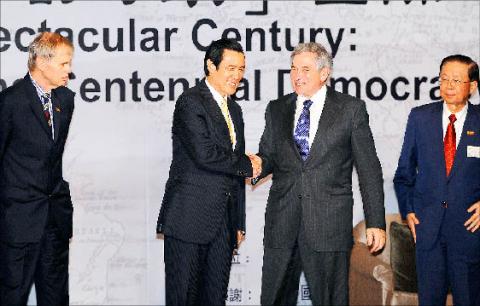Former American Institute in Taiwan (AIT) chairman Richard Bush said in Taipei yesterday that it is important to build a consensus in Taiwan about its core interests so that the country can face the challenges that lie ahead.
The former AIT head, who now serves as the director of the Center for Northeast Asia Policy Studies at the Brookings Institution, made the remark at an international conference titled “A Spectacular Century: The Republic of China (ROC) Centennial Democracy Forums.”
The two-day conference was organized by the Council for Cultural Affairs as part of a year-long celebration of the country’s 100th anniversary.

Photo: Liu Hsin-de, Taipei Times
Speaking on his essay “The Republic of China in Historical Perspective,” he said that Taiwan’s status is appropriate for modern governance, but “we may also ask about its capacity.”
“Does Taiwan have a proper evaluation of the coercive threat posed by the People’s Liberation Army [PLA] that is seriously expanding its war-fighting capabilities?” he asked. “Does Taiwan’s defense establishment, which properly shifted its mission from offense to defense decades ago, need to find ways to strengthen deterrence?”
He said that Taiwan faces tough decisions, such as how to achieve the goals of prosperity, social welfare and security simultaneously.
The toughest challenge of all, he said, is how to cope with a China that seeks to complete its mission of unification.
A local professor asked Bush how he thought Taiwan should deal with China’s unification mission.
Bush replied that he is working on a new book about the relationship between Taipei and Beijing and does not wish to give away the conclusion of his book. However, he did divulge one piece of advice: “I would say it is important to build a consensus on the island about what is truly important for the future of the people on this island.”
He asked participants to think about “what are the things that Taiwan can defend at all costs.” He said without consensus between opinions from both the green and blue spectrum, it is much harder to face that challenge.
Bush also clarified his two-China statement made at a conference in Washington last month.
“There is a huge misunderstanding,” he said. “I in no way advocated the two-China formula as the basis for resolving the disputes between the two sides.”
He said his statement was created by imaginative reporters and the two Chinas he was referring to was the thinking that US officials have accepted over the last 60 years in addressing the challenge of keeping the ROC in the UN.
Former World Bank chairman Paul Wolfowitz also gave a speech at the conference, in which he said that Taiwan is a model of democracy for China and that its economy and politics have had effects on China’s development.
The conference was also attended by Tien Hung-mao (田弘茂), president of the Institute for National Policy Research, and a number of foreign academics including Roderick MacFarquhar of Harvard University, Thomas Gold of California University of Berkeley, and Diana Lary from Canada’s University of British Columbia.

Taiwanese can file complaints with the Tourism Administration to report travel agencies if their activities caused termination of a person’s citizenship, Mainland Affairs Council Minister Chiu Chui-cheng (邱垂正) said yesterday, after a podcaster highlighted a case in which a person’s citizenship was canceled for receiving a single-use Chinese passport to enter Russia. The council is aware of incidents in which people who signed up through Chinese travel agencies for tours of Russia were told they could obtain Russian visas and fast-track border clearance, Chiu told reporters on the sidelines of an event in Taipei. However, the travel agencies actually applied

New measures aimed at making Taiwan more attractive to foreign professionals came into effect this month, the National Development Council said yesterday. Among the changes, international students at Taiwanese universities would be able to work in Taiwan without a work permit in the two years after they graduate, explainer materials provided by the council said. In addition, foreign nationals who graduated from one of the world’s top 200 universities within the past five years can also apply for a two-year open work permit. Previously, those graduates would have needed to apply for a work permit using point-based criteria or have a Taiwanese company

The Shilin District Prosecutors’ Office yesterday indicted two Taiwanese and issued a wanted notice for Pete Liu (劉作虎), founder of Shenzhen-based smartphone manufacturer OnePlus Technology Co (萬普拉斯科技), for allegedly contravening the Act Governing Relations Between the People of the Taiwan Area and the Mainland Area (臺灣地區與大陸地區人民關係條例) by poaching 70 engineers in Taiwan. Liu allegedly traveled to Taiwan at the end of 2014 and met with a Taiwanese man surnamed Lin (林) to discuss establishing a mobile software research and development (R&D) team in Taiwan, prosecutors said. Without approval from the government, Lin, following Liu’s instructions, recruited more than 70 software

Chinese spouse and influencer Guan Guan’s (關關) residency permit has been revoked for repeatedly posting pro-China videos that threaten national security, the National Immigration Agency confirmed today. Guan Guan has said many controversial statements in her videos posted to Douyin (抖音), including “the red flag will soon be painted all over Taiwan” and “Taiwan is an inseparable part of China,” and expressing hope for expedited reunification. The agency last year received multiple reports alleging that Guan Guan had advocated for armed reunification. After verifying the reports, the agency last month issued a notice requiring her to appear and explain her actions. Guan